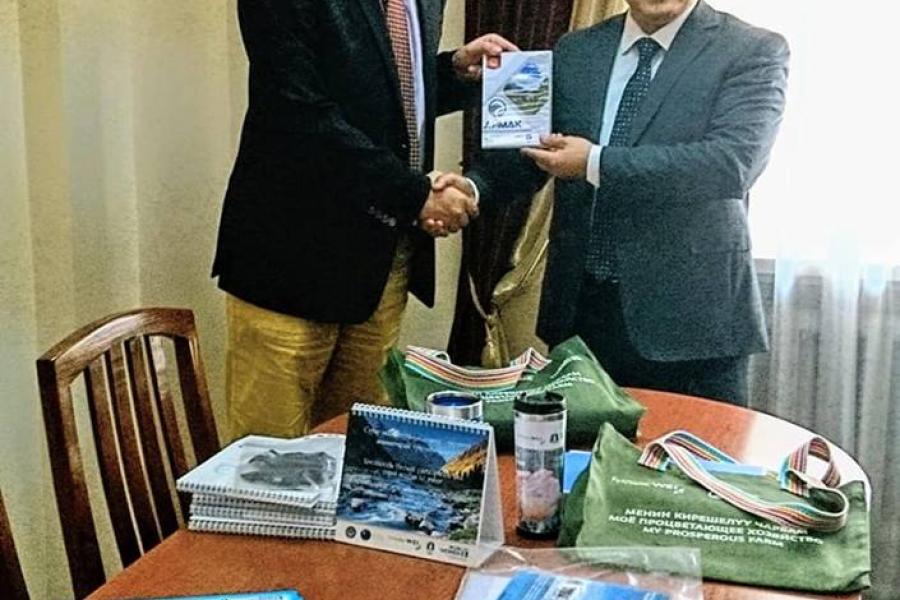UN Women debriefed the Government Office on “Livelihoods through Participation and Equal Access to Water” project results
20 August 2018
- Mr. Gerald Gunther, Representative of the UN Women Country Office in the Kyrgyz Republic, recently met with Mr. Jenishbek Asankulov, the Head of the Government Office unit on Local Self-Government, Mr. Murat Baidyldayev, the Deputy Director of the State Agency on LSG and Interethnic Relations under the Government Office, and Mr. Nurbek Iliyazov, Expert from the Department on Defense, Law Enforcement and Emergency under the Government office in the office of the Government of the Kyrgyz Republic.
The purpose of the meeting was the formal hand-over of knowledge products developed within the “Livelihoods through Participation and Equal Access to Water” project and brief Government on its results. The Government officials thanked UN Women Kyrgyzstan for the practical approach to project implementation, real partnership with the state at various levels and the generation of replicable products in line with Government strategies, such as the AIMAK e-governance system.
Mr. Jenishbek Asankulov, the Head of the Government Office unit on Local Self-Government, highlighted the need for replication of AIMAK in all municipalities, as AIMAK has great potential to be the primary data management tool for the Government big data strategy TUNDUK. AIMAK which has been refined over some time in 2018, the Year of Regional Development, was a timely contribution to ensuring local e-governance. UN Women was requested to replicate AIMAK within its new projects, such as those funded by the UN Peace-building Fund. UN Women agreed to this request and invited the Government Office to make suggestions for the further expansion of geographical and thematic coverage of AIMAK.
The UN Women executed “Securing Livelihoods for the Vulnerable through their Participation in Local Governance and the Efficient use of Water Resources” was implemented between October 2015 and June 2018 in partnership with the Rural Advisory Services, Jalalabad. The project was part of the broader FinWaterWEI II programme implemented in Kyrgyzstan and Tajikistan with Government of Finland as donor and SYKE as the donor’s administrator.

Implemented in seven municipalities within three provinces of the Kyrgyz Republic, the project aimed at securing livelihoods for vulnerable women, men and children through efficient on-farm use of water and equitable community governance of water resources. As a direct result, the project improved access of over 18,000 water users, including 3,000 from vulnerable groups, to irrigation water in seven municipalities in Kyrgyzstan. Yet, more important and the primary aim of the project was the elaboration of a new model integrating local self-government, water users’ associations, schools and vulnerable women to ensure access of all to irrigation water through participatory governance.
The project helped enhance UN Women’s e-governance suite AIMAK which enables local self-governments to provide services more effectively and efficiently to citizens and is being considered by the central government to be integral part of the national e-governance system.
The project’s emphasis on improving life and livelihoods skills of secondary school children prevents early marriages and reduces the incidence of domestic violence. It provides for economically attractive and sustainable alternatives to migration of young people from their villages.
Key to the project’s success was UN Women’s direct engagement in project implementation, a philosophy that sets UN Women Kyrgyzstan apart from many development partners. UN Women Kyrgyzstan directly implements aspects of its projects in areas where UN Women personnel have comparative advantage, drawing on civil society and private sector service providers in areas where they offer comparative advantage, rather than contracting out all funds and implementation responsibilities to third parties. This approach ensures that UN Women is fully engaged in project implementation, can ensure quality, and through building direct partnerships with state and community actors can ensure the key ingredient to successful project implementation for sustainable development which is the mobilisation and networking of local partners in project communities so that the local governance structure as established is made functional.
Within the framework of the project, the collaboration has been strengthened between local governments and water user associations (WUAs), including the community in seven municipalities through various interventions such as:
• introduction of the AIMAK e-governance system in seven municipalities
• introduction of an information system for Water User Associations (WUAs) on water users accounting and electronic water resources management in six WUAs
• introduction of extra-curricular education courses "My Safe and Peaceful School" and "My Prosperous Farm" for secondary school students
• creation of self-help groups among vulnerable women to improve their economic status and their empowerment to participate in the community development processes
• advocacy initiatives of school students among community residents about equal opportunities and access to water resources and their effective use
• support of small WUA infrastructure initiatives to ensure equal and timely access of water users, including those from vulnerable groups
• support of small infrastructure initiatives of schools to improve WASH conditions in 13 schools in seven municipalities
Knowledge products that were handed over:
- My Safe and Peaceful School Manuals (in Kyrgyz, Uzbek, Russian)
- My Prosperous Farm Manuals (in Kyrgyz, Russian, Uzbek and Tajik)
- Aimak e-governance system with users’ guide
- E-water governance system for WUAs
- Flyers on WUA and WASH
- Project Reports.


